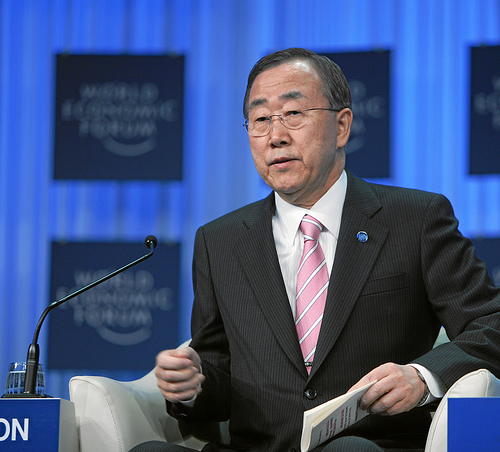
UN Secretary-General, Mr. Ban Ki-moon
A new report launched by the United Nations says a revamp of the global partnership for development (MDG 8) is necessary due to persistent gaps in development assistance, access to markets, medicines and technologies.
Millennium Development Goal 8 was to develop an open and fair global trading and financial system, assist developing countries, assist developing landlocked and small island countries, address their debt problems and access to drugs and technologies.
“Taking Stock of the Global Partnership for Development”, launched on Friday by United Nations Secretary General Ban Ki-moon, is the final report of the UN MDG Gap Task Force: a coalition of over 30 international organizations, most of which are under the United Nations, monitoring the achievements and challenges in the implementation of MDG 8.
“Achieving the SDGs will require an even stronger global partnership, complemented by multi-stakeholder partnerships to mobilize and share knowledge, expertise, technology and financial resources”, UN Secretary General Ban Ki-moon said of MDG 8 and the world’s preparation to transition to the Sustainable Development Goals (SDGs):
The task force’s report is mixed, noting several successes and major gaps as well that persist in development of aid flows to the least developed countries, and in eliminating trade barriers for developing countries.
It noted that many people do not have affordable access to essential medicines and the internet: a survey from 2007 to 2014 showed that generic medicines were available on average in 58.1 per cent of public health facilities and in 66.6 per cent of private facilities, while only 32 per cent of people were estimated to be using the internet in 2014, as against 80 per cent in developed countries.
Some substantial gains were reported such as reduction in debt, a 13.3 per cent increase in developing countries’ access to developed-country markets, and a 66 per cent increase in official development assistance flows from 2000 to 2014.
The report says about 75 per cent of low income countries are currently regarded as having low or moderate debt distress risk under the World Bank and IMF debt sustainability framework though in a third of the countries, debt levels are high or have increased recently.
Official development assistance in 2014 is estimated at $135.2 billion by the Development Assistance Committee of the Organization for Economic Cooperation and Development.
The donors according to the report, have also strengthened aid effectiveness efforts including increasing the reporting of official development assistance in national budgets, and strengthening country administrative systems in the management of aid-funded programmes and projects, to reduce administrative burdens on recipients.
The task force however said contributions of the Development Assistance Committee donors were however collectively short of the UN’s target of 0.7 per cent of gross national income and at 0.29 per cent of gross national income with only Denmark, Luxembourg, Norway, Sweden and the United Kingdom met their targets, the rest leaving a gap of $191 billion.
Source: Ghana Business News























